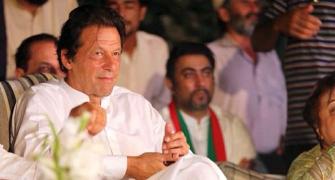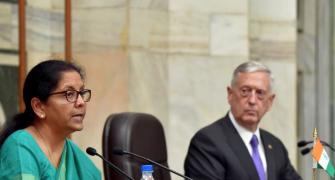
Secretary of State Mike Pompeo met Pakistan's new Prime Minister Imran Khan on Wednesday and pressed him to take 'sustained and decisive measures' against terrorists threatening the regional peace and stability, days after the United Sates cancelled $300 million in military aid to Islamabad for failing to rein in the terror groups operating from its soil.

US Secretary of State Mike Pompeo and Defence Secretary Jim Mattis arrived in New Delhi on Wednesday to hold the inaugural two-plus-two talks with their Indian counterparts, focus of which will be to deepen strategic ties and resolve differences over India's defence engagement with Russia and crude oil import from Iran.
Reflecting the importance of the talks to be held on Thursday, External Affairs Minister Sushma Swaraj received Pompeo, while Defence Minister Nirmala Sitharaman welcomed her US counterpart Jim Mattis at the Palam airport.
Swaraj and Sitharaman will hold the twice-postponed dialogue with Pompeo and Mattis. Chairman of the US Joint Chiefs of Staff General Joseph Dunford is also part of the US delegation.
'In a special gesture symbolising our warm and friendly relationship, EAM @SushmaSwaraj received United States Secretary of State @SecPompeo at the airport on his first visit to India,' MEA spokesperson Raveesh Kumar said in a tweet.
The external affairs minister will have a separate bilateral meeting with Pompeo while Sitharaman will have a one-on-one meeting with Mattis on Thursday morning before the delegation-level two-plus-two talks.
12 officials from each side are expected to attend the talks which will be followed by a working lunch.
In the afternoon, Swaraj, Sitharaman, Pompeo and Mattis will call on Prime Minister Narendra Modi.
As Secretary Pompeo arrived in New Delhi from Islamabad, India will also try to get his view about his engagement with the new government in Pakistan headed by Prime Minister Imran Khan, official sources said.
In the talks, the sources said, India will also try to 'sensitise' the US that any cut in import of Iranian oil in compliance with the US sanctions may impact the country's overall economy as the crude oil from that country is much cheaper.
India is also expected to apprise the US about the importance of the Rs 40,000 crore deal it is about to finalise with Russia to procure a batch of S-400 Triumf air defence missile systems.
The US has been indicating that it does not want India to go ahead with the deal.
The sources said both sides will also discuss the long-pending Communications, Compatibility, Security Agreement.
The COMCASA will help India obtain critical and encrypted defence technologies for Indian defence platforms from the US.
The sources said text of the agreement is almost ready.
They said both sides will also explore ways to enhance engagement between their navies in the Indo-Pacific region and try to resolve tariff-related issues.
On import of Iranian oil, the sources said India may also convey to the US that some of its refineries are dependent on certain kind of crude oil and making technical adjustments in them may require huge investments as well as time.
Pompeo, the former Central Intelligence Agency chief who was on his first visit to Pakistan as the top American diplomat, told Khan that he was 'pleased' with his meeting with Foreign Minister Shah Mahmood Qureshi earlier in the day.
But at the same time, Pompeo asked Khan 'to do more' at the meeting, which was also attended by Army chief General Qamar Javed Bajwa and Foreign Minister Qureshi, Geo TV reported, citing diplomatic sources.
This was the US' first high-level dialogue with Pakistan since the new government of Prime Minister Khan assumed office after the July 25 elections and comes days after the US cancelled $300 million in military aid to Islamabad for not doing enough against terror groups active on its soil.
Talking to reporters travelling with him, Pompeo said, "We made clear to them that -- and they agreed -- it's time for us to begin to deliver on our joint commitments, right."
"So we've had lots of times where we've talked and made agreements, but we haven't been able to actually execute those.
"And so there was broad agreement between myself and Foreign Minister Qureshi, as well as with the prime minister, that we need to begin to do things that will begin to actually, on the ground, deliver outcomes so that we can begin to build confidence and trust between the two countries," he added.
State Department spokesperson Heather Nauert said that in all of his meetings, Secretary Pompeo conveyed the need for Pakistan to take 'sustained and decisive measures against terrorists and militants threatening regional peace and stability'.
Later, Qureshi told reporters that the Pakistani perspective was presented responsibly to the US delegation.
"We tried to understand their wishes and put forth our own expectations and concerns," he said, adding, "Ice has been thawed."
"Today, we felt that we have created an atmosphere to reset our relations, and the lack of trust that was present has been broken which is a very positive development.
"Believe me, if our narrative had not set in with them, the atmosphere would have been different...," he said.
"I told them that if you want to proceed with Pakistan, the foundation lies in trust, frank and candid conversation. And until and unless we address concerns from both the sides, progress is not possible," he said.
Regarding the US delegation's meeting with Prime Minister Khan, Qureshi said: "During the meeting at the PM House we all sat down and exchanged views. In the past, they used to come, meet the PM and then went to the GHQ (Army headquarters). Today's meeting sent a clear message that we are all on the same page."
Qureshi said he decided against raising the US decision to scrap the $300 million in aid.
"That decision was taken before this govt took charge. I gave this matter some thought then I decided against raising it because free nations think along the lines of self-sufficiency. We will take a new direction," he said.
"The meeting has created environment to reset the relations and removed the hiatus," he added.
The two sides also discussed the Afghan peace process.
Pompeo, who along with US Joint Chief of Staff Chairman Gen Joseph Dunford had arrived on an official visit to Pakistan, earlier met Qureshi and discussed 'bilateral, regional and international issues'.
In a statement, the Foreign Office said Qureshi highlighted that the priority of the new Government was socio-economic development and for the success of people centered agenda and economic reforms, an enabling regional security environment was imperative.
He said improving relations with neighbours was a priority, in an apparent reference to strained ties with India and Afghanistan, which often accuses Pakistan of providing safe havens to militants to conduct cross border attacks.
Qureshi also reaffirmed Pakistan's commitment to continue efforts for promoting peace and stability in Afghanistan.
'The two sides agreed that present conditions in Afghanistan were conducive to intensifying efforts for a political settlement. They underscored the need for the Taliban to seize the opportunity for talks in response to President Ghani's offer for an unconditional dialogue,' the statement said.
Pompeo stated that US fully supported the reform agenda of Prime Minister Khan and wished the government success in its implementation, it said, adding that Pompeo conveyed the US desire to work with Pakistan in furthering the shared objectives of peace and stability in Afghanistan.
The ties between the two sides strained after President Donald Trump, while announcing his Afghanistan and South Asia policy in August last year, hit out at Pakistan for providing safe havens to 'agents of chaos' that kill Americans in Afghanistan and warned Islamabad that it has 'much to lose' by harbouring terrorists.
He had also slammed Pakistan for its support to terror groups and warned Islamabad of consequences if it continues to do so.
In January, Trump suspended all military assistance to Pakistan accusing it of rewarding past assistance with 'nothing but lies and deceit'.
The ties between the two 'allies' are passing through a difficult period as the US is upset over what it calls lack of cooperation from Islamabad.
Pak seeks US help to ease tensions with India
Pakistan on Wednesday sought US help to ease tensions with India, saying it wanted peace on the Eastern border in order to concentrate on the Western border with Afghanistan.
"We want ease on the Eastern border if we have to look towards the Western side," Qureshi told reporters while briefing them on the outcome of his talks with Pompeo.
Stating that people suffer due to ceasefire violations along the Line of Control, he said, it was 'important that we should look at it and see how we can improve that who can help us to bring the improvement (on Eastern border)'.
He reiterated that Pakistan wanted peace with all its neighbours and had never shied away from negotiations, but 'we need two hands to clap'.
Qureshi said the LoC ceasefire was a very good Confidence Building Measure but when it gets violated, people suffer.
The India-Pakistan ties nose-dived in recent years with no bilateral talks taking place. The ties between the two countries had strained after the terror attacks by Pakistan-based groups in 2016.
India has made it clear to Pakistan that terror and talks cannot go together.
Qureshi said that the visiting US delegation indicated to have direct talks with the Afghan Taliban and Pakistan offered its full support for a negotiated solution of the Afghan issue.
"Pompeo said the State Department will lead the peace effort in Afghanistan. The impression we get is that there is space for (US) direct talks with the Taliban," he said.
He said Pompeo assured that the US did not want to keep its foot print for unlimited period in Afghanistan, though there was no timeline for America to pullout from the strife-torn country.
"US wants that Pakistan should help to move forward the talks. And we will do and we have offered full support as it is according to our policy. We want peace (in Afghanistan)," he said.









